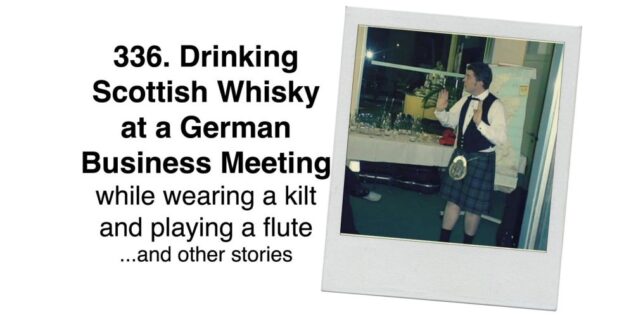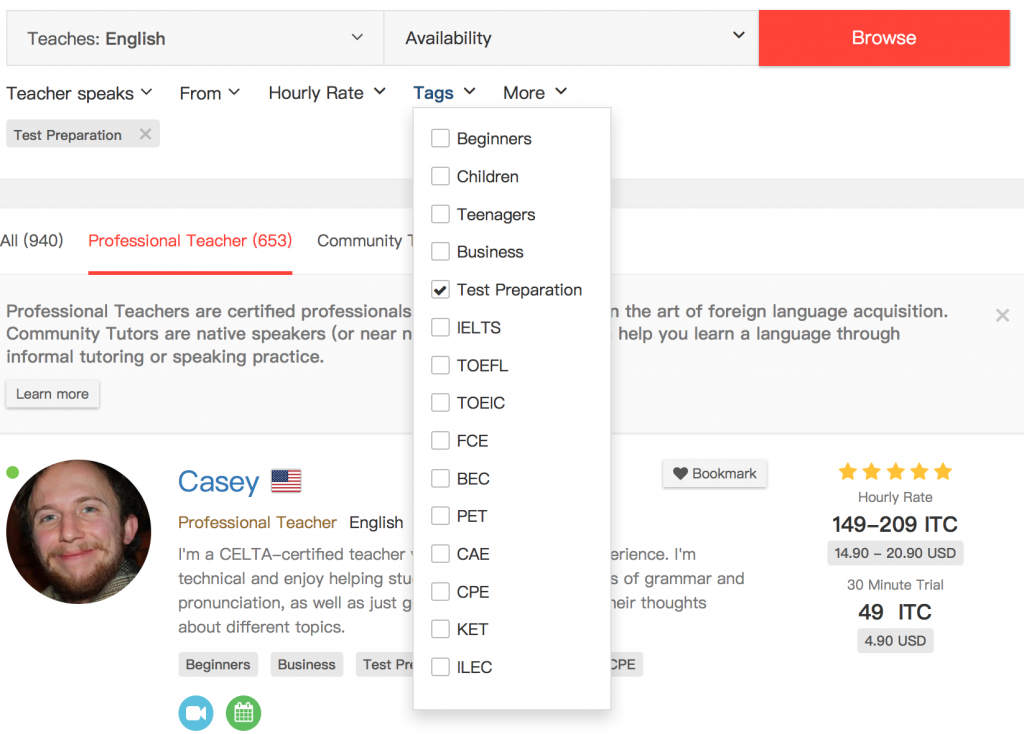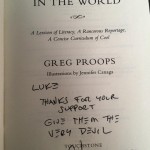Amber & Paul are back on the podcast after a 4 month absence. What have they been doing? Let’s catch up with them again, and respond to some comments from listeners. This episode was recorded in the open air, up on the terrace of my flat in the April sunshine. It’s been almost exactly a year since did Episode 271: Catching up with Amber & Paul, when we sat on the terrace and chatted about TV series, ginger people and getting caught in the sun. Since then Amber & Paul have been on the podcast quite a few times, playing vocabulary & speaking games, planning a bank robbery and generally talking nonsense.
![]() [DOWNLOAD]
[DOWNLOAD]
The most recent time they were on, we played a rematch of The Lying Game. (Amber won, surprise surprise). Then we launched an interactive version of The Lying Game. We’ll be playing that later. If you’re not sure what I’m talking about – just go back into the episode archive and search for episodes with Amber & Paul.
In fact, to make it easier, click here to see links to other episodes featuring Amber & Paul.
Click here to check out Paul’s podcast, “Becoming a Comedian”.
Who are Amber & Paul? (Just in case you don’t already know)
- Both are Brits living in Paris. Both perform stand up.
- Amber has a lovely voice. She does voice overs, does stand-up, trained at the Gaulier school (same as Sacha Baron Cohen) loves books, radio 4 and audiobooks. Speaks French. Is a history nut. Has lived here for about 10 years. Has a baby boy who is now about 2 and a half years old.
- Paul is a stand-up comedian who used to work at Apple but quit that job in order to focus on doing comedy full-time. He speaks English, French & Spanish. Previous appearances on the podcast seem to show that he doesn’t know any words in English ;) and that he always loses competitive games we play. Since his last appearance on the podcast his comedy career has taken off after one of his videos hit 1.5 million views in about a week, and now his one-man show is regularly sold out and he’s being approached by TV companies who want to produce The Paul Taylor TV Show!
Episode Contents (Here’s what you’ll hear in the episode)
- Describing the context and the situation – we’re on the terrace, in the sunshine again
- Amber & Paul introduce each other (for the benefit of any new listeners)
- We share some comments from listeners (I read them out, we all respond)
- What have you both been doing? Anything to report? This conversation will continue in the next episode…
COMMENTS FROM LISTENERS ABOUT AMBER & PAUL
Original comments can be found in the comment section for previous episodes, especially 318. Any errors have been corrected by me – you’re welcome.
Comments about the team…
Gabriel • 4 months ago
I really like the episodes with Amber and Paul :D
Brahim • 4 months ago
You make an amazing team with Amber and Paul
On Paul’s appearance…
mih • a month ago [added to the COMEDY SHOWS page]
omg, I thought Paul was black when I listened to his voice =)
On Amber & Paul’s voices (apparently most people think Amber has an amazingly lovely voice, but Paul has his fans too)…
Marinus
There is something so beautiful in Amber’s voice, Paul always makes me laugh.
Chriss Benitez • 3 months ago
I wasn’t aware of this episode till now. I will say it every time I hear Amber: “Just lovely voice”.
You’ve got a nice accent too Paul, and you do French and Spanish impressions so well. But Amber is a British girl with a lovely accent, there is no better thing on earth :/ sorry.
Dinara • 4 months ago
Paul I totally LOOOVE your voice! It’s charming)
Lê Vũ QC • 4 months ago
As a girl, I quite enjoy Paul’s voice, it sounds boyish and cute :) I’m downloading the episodes of his podcast now. #teamPaul
On Paul’s podcast…
Edelegn • 4 months ago
Absolutely loved Paul’s podcast.
Lê Vũ QC Lê Vũ QC • 4 months ago
OK I listened to the first episode and it was quite hilarious [Luke: absolutely hilarious]. I shouldn’t have been eating dinner while listening though because he talked about some gross stuff there. Very funny podcast nonetheless. :v
Michael Prior • 4 months ago
Hi y’all,
I enjoyed your rematch very much today! It’s just that I found myself thinking that you might have been a bit rude towards Amber, with referring to Paul’s comedy and blog and all. On the other hand, when Amber mentioned she’s doing stand-up as well, it didn’t seem worthwhile elaborating on that. You just let that slide… or did I miss anything? ?
Greetings
Michael from Germany
Luke Thompson to Michael Prior • 4 months ago
Amber does stand up too, but she doesn’t have her own show at the moment, and also doesn’t have her own podcast either. Really, it’s fine – we’re good friends so there was no rudeness or anything. :)
[socialpoll id=”2351448″]
[socialpoll id=”2351449″]
[socialpoll id=”2351457″]
From the Archives: Other Episodes featuring Amber & Paul
- 158 & 159. A Cup of Christmas Tea with… Paul Taylor The first time Paul Taylor has been on the podcast. Paul’s a comedian who works for Apple. We get to know Paul and talk about typical Christmas in the UK. Paul and I copy different accents in English.
- 161. She’s Having a Baby An interview with Amber Minogue, pregnant with her first child, about pregnancy and childbirth.
- 271. Catching Up with Amber & Paul A really funny and friendly conversation with my friends Amber and Paul on a very hot and sunny day in April.
- 272. The Bad Haircut Situation How should you give compliments, accept compliments and give bad news politely in English? Listen to this funny discussion to hear what Amber, Paul and I think.
- 273. The Bad Haircut Situation Part 2: More Role Plays & Improvisations Amber, Paul and I do some improvised comedy and demonstrate ways of dealing with awkward situations in English.
- 283. Ten Fixed Expressions A fun game in which I test Paul Taylor’s vocabulary and we teach 10 natural expressions.
- 285. Ten More Fixed Expressions A funny episode in which I test Paul Taylor on his knowledge of vocabulary, and we teach you some more expressions.
- 287. VOCAB BATTLE!!! WITH AMBER & PAUL (exciting title) Fun and games with Amber, Paul and some natural English expressions.
- 296. Learning Comedy is like Learning a Language A conversation with Paul Taylor about his experiences at the Edinburgh fringe festival, and how learning to do comedy is similar to learning to speak a foreign language.
- 298. The Bank Robbery (Part 1) A speaking exercise with native speakers. How will Amber, Paul and Sebastian plan the perfect bank robbery?
- 299. The Bank Robbery (Part 2) Listen to native speakers planning a bank robbery in this fun simulation.
- 306. The Mystery of Corporate Jargon & Management Speak (Part 1) Why do people use these phrases, and why do so many people hate language like this? And, what is bullsh*t bingo?
- 307. The Mystery of Corporate Jargon & Management Speak (Part 2) I’m joined by Paul Taylor as we discuss specific words and phrases used in the world of business.
- 308. The Lying Game (Part 1) With Amber & Paul Amber, Paul and I play another speaking game. Can you guess if we’re lying or telling the truth? Listen carefully.
- 309. The Lying Game (Part 2) With Amber & Paul Here’s part 2 of this speaking game with Amber and Paul. Listen until the end to hear me explain how I use this game in my English classes (hello teachers).
- Attacks in Paris Paul Taylor was just a few meters away from one of the shootings that took place in Paris this week. He tells me all that he saw and what happened.
- 310. The Words of the Year (Part 1) In all 3 of these episodes I explain and clarify a lot of what we say in these funny conversations so that you can learn, laugh and understand everything.
- 311. The Words of the Year (Part 2) Learn some new language, and listen to some discussions and anecdotes related to these words.
- 312. The Words of the Year (Part 3) Amber, Paul and I talk about some new words which were added to the Collins dictionary this year.
- 317. The Rematch (Part 1) With Amber & Paul Will Paul finally win a game on this podcast? Listen to find out.
- 318. The Rematch (Part 2) with Amber & Paul Listen to your favourite podcast guests play another speaking game and try to guess if we’re lying or telling the truth.

 italki
italki





















